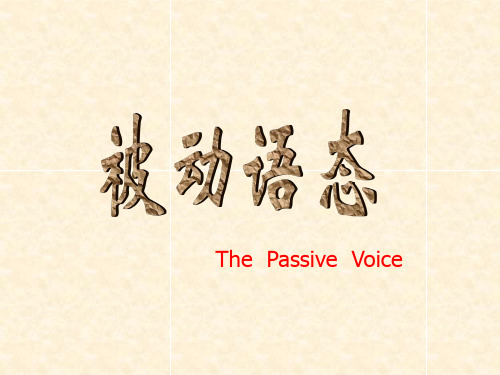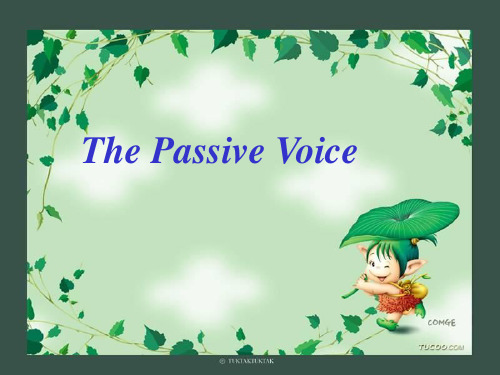最新初中英语语法知识—被动语态的图文解析
被动语态(15张PPT)初中英语专项复习课件

主动语态变被动语态的方法
英语的谓语动词有两种状态
We 主语
speak 谓语
English. 宾语
English 主语
is spoken 谓语
by us. 宾语
主动语态变被动语态的方法
主动结构:
1 The people always open the
window.
被动结构:
1 The window is always opened by
3 主动: see sb do
被动: sb be heard to do
Lucy was heard to sing in the classroom by me.
被动: sb be seen to do
I see Jack play the basketball
改成
in the playground.
the people .
2
主动结构: They will design a new bike in the
2
被动结构: A new bike will be designed by them
factory.
in the factory.
3
主动结构: He cut down a tree.
3 被动结构:
A tree was cut down by him.
主动省略to被动还原to
1 主动: make sb do I made my sister cry.
被动: sb be made to do
改成
My sister was made to cry by me.
2 主动: hear sb do I heard Lucy sing in the classroom. 改成
最新初中英语语法知识—被动语态的图文解析

一、选择题1.If a driver _________ to park in the wrong place, he’ll get a fine.A.finds B.is found C.has found 2.—Excuse me, sir, smoking ________ in the high-speed train.—Oh, I'm really sorry. I won’t do it anymore.A.isn’t allowed B.wasn’t allowed C.doesn’t allow D.won’t allow 3.I won't leave my office until my work___________.A.finishes B.will finish C.is finished D.finishing 4.Fenghua teaching building _______ 17 years ago.A.built B.is built C.builds D.was built5.I don’t think teenagers should to go to net bars.A.allow B.be allowing C.allowed D.be allowed 6.—The classroom is very tidy.—Yes . it every day.A.cleaned B.cleans C.is cleaned 7.—Where did you go last night?—I to go to Li Lei’s birthday party.A.asked B.am asked C.have been asked D.was asked 8.— Do you know the young man was charged murdering his boss?—But I don't think he is guilty that crime.A.for; of B.with; of C.of; with D.with; for9.―When shall we go and play basketball?―Not until the work tomorrow.A.will finish B.has finished C.is finished D.will be finished 10.—Why didn’t you come to Jenny’s birthday party yesterday?—Because I________.A.didn’t invite B.isn’t invited C.wasn’t invited D.haven’t invited 11.—When can we go to watch the football match?—Not until the work________tomorrow.A.will be done B.has done C.is done D.does12.We' re proud that our school is________one of the best schools in our province. A.think to be B.thought to C.thought to be D.thought will be 13.--- Mom, where is my model plane?--- Oh, it ______ to Jenny yesterday.A.is lent B.lends C.was lent D.lent14.The weatherman says a heavy rain _______ next week.A.expects B.was expected C.will expect D.will be expected 15.—Your hometown is beautiful,and the air is really fresh.—Yes.Many trees and flowers around here every year.A.plant B.are planted C.was planted D.will plant 16.Both Lily and Lucy ______________to the party yesterday, but they didn't come at all. A.agreed B.sent C.were called D.were invented 17.Many tall buildings in Fangshan last year.A.are built B.were built C.built D.build18.— Do you know when the bridge ?—Yes, last year.A.was built B.is built C.build D.builds19.I won’t come to the dinner party at Lisa’s hous e tonight if my brother ______. A.didn’t invite B.won’t invite C.isn’t invited D.won’t be invited 20.Teenagers should __________to smoke. It’s too bad for their health.A.not allow B.not be allowed C.allow21.You can go out if all your homework________.A.done B.is done C.was done D.will be done 22.A year has four seasons and it ______ twelve months.A.divides in to B.divided intoC.is divided into D.is dividing into23.As we all know, the Anti-Japanese War ________ in 1937, and ________ for eight years. A.was broken out; lasted B.broke into;lastedC.broke out; was lasted D.broke out;lasted24.The mobile phone________in 1973.A.invents B.is inventedC.invented D.was invented25.During the May Day holiday, the Trents went to a beautiful place in China. It _______ “Laoshan”.A.was called B.called C.is called D.calls 26.—Look, what have you done?—Sorry, I think if I ________another chance, I’ll do it better.A.give B.will be given C.will give D.am given 27.(2017·河南·29)—Why are you leaving your job?—I can't stand it any longer. I ________ always ________ to work overtime.A.am;asking B.am;asked C.was;asking D.was;asked 28.—Do you have any problems if you ______ this job?—Well, I’m thinking about the working day.A.offer B.will offer C.are offered D.will be offered 【参考答案】***试卷处理标记,请不要删除一、选择题1.B解析:B【解析】【分析】【详解】句意:如果司机被发现在错误的地方停车,他会被罚款。
各大时态的被动语态讲解ppt课件

把主动语态变为被动语态可按“一变、二套、三注意”来进行。 即: 一变---把主动语态的宾语改为被动语态的主语,把主动语态的主语 改为被动语态的介词by的宾语。 二套---根据原句的时态套用相应的时态。 三注意---注意人称的变化而引起的主谓一致问题。 例如: Many people speak English. English by many people. He washed his shoes yesterday. His shoes by him yesterday.
1.He can take care of the baby. 2.Lucy may draw the pictures. 3.You must turn off the lights. 4.They should learn English well. 5.Jim could do it yesterday.
He looked after the little baby yesterday.
主
谓
宾(受动者)
The little baby
was looked after
by
him
yesterday .
They built the tall building last year. He took good care of his little brother yesterday. We cleaned our classroom just now. They used this room for resting. They planted many trees years ago.
We have made twenty more keys.
Twenty more keys have been made by us. 现在完成时: S+ have/has + been+过去分词
被动语态用法详解被动语态用 ppt课件

The jacket is used for keeping warm. The jacket is made in Guangzhou.
summary
英语中动词有主动语态和被动语态 两种语态。主动语态表示主语是动作的 执行者,被动语态表示主语是动作的承 受者, 在被动语态中动作的执行者有时 用by短语表示出来.
I have been told the sports meeting might be put off.
(2)He has brought his book here. His book has been brought here.
(三)常见的八种时态中的被动语态 8. 过去完成时:
(1)When I got to the theatre, I found they had already sold out the tickets.
一般现在时: am / is / are + done 一般过去时: was / were + done 一般将来时: shall / will + be done 含有情态动词 should / would + be done 现在进行时: am / is / are + being + done 过去进行时: was / were + being + done 现在完成时: have / has + been + done 过去完成时: had + been + done 将来完成时: shall / will + have been + done 过去将来完成时: should / would + have been +;t forget his lessons easily.
初中英语——被动语态讲解(共43张PPT)

2. ---Did you call everybody to take part in the party? ---Yes,the invitations____to them. A. have sent B. was sent C. is sent D. have been sent
3. No decision___ about the environment protection until all the students and teachers arrive.
6. ---- Have you handed in your schoolwork yet?
---- Yes, I have. I guess it__ . A. has graded B. is graded C. is grading D. has been graded
7. A coat can warm. A.is used
(hold) every four years.
3.The 2012 Olympics _w_e_r_e_h__el_d_____
(hold) in London .
4.The problem _is__g_o_in_g__t_o_b_e__d_is_c_ussed
(discuss) at the meeting tomorrow .
A. need repairing B. needs to repair C. needs repairing D. need to repair
*This table wants cleaning. =This table wants to be cleaned.
1. The water___ cold at this time of
语法被动语态PPT课件

冠词缺失或多余错误
1 2 3
错误示例 This is a interesting book.
错误分析 冠词“a”应修饰以元音音素开头的单词,而 “interesting”以辅音音素开头,因此不需要使 用“a”。
纠正方法 去掉冠词“a”,即“This is an interesting book.”。
用法
学生自我评价报告
对于被动语态的构成和用法有了 更清晰的认识,能够较准确地判 断句子中的被动语态并进行相应
的转换
在练习过程中,对于某些特殊情 况下的被动语态掌握不够熟练,
需要进一步加强练习和记忆
通过本次学习,对于英语语法的 重要性有了更深刻的认识,将更
加注重语法知识的学习和应用
拓展延伸:主动变被动,提升表达能力
注意被动语态的时态和语态的 正确使用,确保语法准确无误。
翻译技巧分享
01
02
03
04
技巧一
理解源语言和目标语言之间的 差异,包括语法结构、表达习
惯和文化背景等。
技巧二
在翻译过程中,注意保持原文 的语义和语境,确保翻译结果
准确传达原文的意思。
技巧三
根据目标语言的表达习惯,对 原文进行适当的调整和优化,
疑问句结构
Am/Is/Are + 主语 + being + 动词的过去分词 + 其他成分?
03
被动语态在句子中成分分析
作主语
要点一
被动语态作主语时,通常表示一个 被动的动作或状态,例如
“这本书被出版了”可以转换为“这本书的出版是近期的一 个文化事件”。
要点二
在科技、学术等领域的文章中,使 用被动语态作主语可以使句…
被动语态(31张PPT)初中英语专项复习课件(2)
商店每天八点开门。
温故知新
No sooner had she got out of her car than two
men in black
(push) her into the car with
a gun pointing her.
The tree was planted (by Tom) last year.
释义:这棵树是去年(由汤姆)种的。
特殊句型被动语态的转换
(1)“主语+谓语+宾语+宾语补足语”变为 被动语态。
只需将宾语变为被动句中的主语,宾补就成 为被动句 中的主语补足语。另外,如果主动句中的宾 补是不带 to的不定式,当句子变成被动语态后,要还 原to。
by farmers in spring.
原宾语 be+过去分词
by+原主语
状语
步骤一:把原主动句的宾语转换成被动句中的主语。
步骤二:把原动词改为“be+过去分词”的形式。动词的人 称和数要随着新的主语而改变,同时be动词的时态不变。 不论是什么形态,被动语态的句子都必定要有一个be动词。
步骤三:原来主动语态中的主语,如需强调就放在by后面 以他的宾格形式出现,以指明发出动作的人或物。如果没 有必要,则可以省略。
The room needs cleaning.
相当于to be cleaned
这个房间需要打扫。
3)形容词worth后面跟动名词的主动形式表示被动 含义,但不能跟动词不定式。
The art show is well worth visiting.
这个艺术展值得参观。
被动语态的用法归纳图
被动语态的用法归纳图哎呀,说起被动语态,这可是英语学习中的一个重要知识点呢!咱们今天就来好好归纳归纳被动语态的用法。
我记得之前教过的一个学生小明,他一开始对被动语态那叫一个头疼。
有一次课堂上做练习,题目是“这个房子是去年建造的。
”小明毫不犹豫地写成了“This house built last year” 我一看,就知道他还没搞清楚被动语态的用法。
咱们先来说说啥是被动语态。
简单来说,就是主语是动作的承受者,而不是执行者。
比如说,“The book was written by him”(这本书是他写的)在这个句子里,“书”不能自己写,而是被“他”写,所以用了被动语态。
被动语态的构成一般是“be +过去分词”。
这里的“be”要根据时态变化哟!一般现在时就是“am/is/are +过去分词”,比如“English is spoken all over the world”(全世界都讲英语);一般过去时就是“was/were +过去分词”,像“The window was broken by Tom”(窗户被汤姆打破了);一般将来时是“will be +过去分词”,比如说“T he sports meeting will be held next week”(运动会将在下周举行)。
再说说被动语态在不同时态中的具体用法。
过去进行时是“was/were being +过去分词”,比如“At that time the machine was being repaired”(那时机器正在被修理);现在完成时是“have/has been +过去分词”,像“The work has been finished”(工作已经完成了);过去完成时则是“had been +过去分词”,比如说“The room had been cleaned before we came”(我们来之前房间已经被打扫过了)。
还有哦,被动语态在一些特殊情况下的用法也得注意。
初中英语语法被动语态讲解课件共29张
1.--- What do you think of the football match
yesterday ?
--- It’s surprising. The strongest team ____A__.
The glass was broken by the boy.
从主动语态变为被动语态
1.主语 2.谓语 3.宾语
介词by +宾语 加be,并变为过去分词
主语
变化: The boy broke the glass.
示例
The glass was broken by the boy.
1.They make shoes in that factory. 主语+及物动词+宾语
Mr. Smith_i_s_c_a_l_le_d__ a living Lei Feng (by us).
2.Tom’s father bought him a book. He ____w__a_s_b_o_u_g_h_t a book (by his father) A book_w__a_s_b_o_u_ght to _him (by his father)
4,动词短语变被动语态,后面的介词不能丢。
take care of → be taken care of cut down → be cut down laugh at → be laughed at look after → be looked after
不用被动语态:
1,stop , 是不及物动词,因此不能变为被动
被动语态(21张PPT)初中英语专项复习课件
(4)特殊疑问句式 ①特殊疑问词(不作主语)+情态动词+主语+be原形+过 去分词 When can my computer be repaired? 我的电脑什么时候能修好? ②特殊疑问词(作主语)+情态动词+be原形+过去分词 What must be done next? 下一步该做什么?
1.—Why does the earth look blue in space?
考点四 :一般将来时的被动语态 (will+be+done;am/is/are going to+be+done)
A new school library will be built next year. 一个学校的新图书馆将明年建成。(肯定句) →A new school library won’t be built next year. (否定句,在will后加not) →Will a new school library be built next year? (一般疑问句,把will提句首)
A new school library is going to be built next year. 一个学校的新图书馆将明年建成。(肯定句) →A new school library isn’t going to be built next year. (否定句,在is/am/are后加not) →Is a new school library going to be built next year? (一般疑问句,把is/am/are提句首)
3.More chances _____B_ for students to learn from each
- 1、下载文档前请自行甄别文档内容的完整性,平台不提供额外的编辑、内容补充、找答案等附加服务。
- 2、"仅部分预览"的文档,不可在线预览部分如存在完整性等问题,可反馈申请退款(可完整预览的文档不适用该条件!)。
- 3、如文档侵犯您的权益,请联系客服反馈,我们会尽快为您处理(人工客服工作时间:9:00-18:30)。
一、选择题1.If a driver _________ to park in the wrong place, he’ll get a fine.A.finds B.is found C.has found 2.—Excuse me, sir, smoking ________ in the high-speed train.—Oh, I'm really sorry. I won’t do it anymore.A.isn’t allowed B.wasn’t allowed C.doesn’t allow D.won’t allow 3.I won't leave my office until my work___________.A.finishes B.will finish C.is finished D.finishing 4.Fenghua teaching building _______ 17 years ago.A.built B.is built C.builds D.was built5.I don’t think teenagers should to go to net bars.A.allow B.be allowing C.allowed D.be allowed 6.—The classroom is very tidy.—Yes . it every day.A.cleaned B.cleans C.is cleaned 7.—Where did you go last night?—I to go to Li Lei’s birthday party.A.asked B.am asked C.have been asked D.was asked 8.— Do you know the young man was charged murdering his boss?—But I don't think he is guilty that crime.A.for; of B.with; of C.of; with D.with; for9.―When shall we go and play basketball?―Not until the work tomorrow.A.will finish B.has finished C.is finished D.will be finished 10.—Why didn’t you come to Jenny’s birthday party yesterday?—Because I________.A.didn’t invite B.isn’t invited C.wasn’t invited D.haven’t invited 11.—When can we go to watch the football match?—Not until the work________tomorrow.A.will be done B.has done C.is done D.does12.We' re proud that our school is________one of the best schools in our province. A.think to be B.thought to C.thought to be D.thought will be 13.--- Mom, where is my model plane?--- Oh, it ______ to Jenny yesterday.A.is lent B.lends C.was lent D.lent14.The weatherman says a heavy rain _______ next week.A.expects B.was expected C.will expect D.will be expected 15.—Your hometown is beautiful,and the air is really fresh.—Yes.Many trees and flowers around here every year.A.plant B.are planted C.was planted D.will plant 16.Both Lily and Lucy ______________to the party yesterday, but they didn't come at all. A.agreed B.sent C.were called D.were invented 17.Many tall buildings in Fangshan last year.A.are built B.were built C.built D.build18.— Do you know when the bridge ?—Yes, last year.A.was built B.is built C.build D.builds19.I won’t come to the dinner party at Lisa’s hous e tonight if my brother ______. A.didn’t invite B.won’t invite C.isn’t invited D.won’t be invited 20.Teenagers should __________to smoke. It’s too bad for their health.A.not allow B.not be allowed C.allow21.You can go out if all your homework________.A.done B.is done C.was done D.will be done 22.A year has four seasons and it ______ twelve months.A.divides in to B.divided intoC.is divided into D.is dividing into23.As we all know, the Anti-Japanese War ________ in 1937, and ________ for eight years. A.was broken out; lasted B.broke into;lastedC.broke out; was lasted D.broke out;lasted24.The mobile phone________in 1973.A.invents B.is inventedC.invented D.was invented25.During the May Day holiday, the Trents went to a beautiful place in China. It _______ “Laoshan”.A.was called B.called C.is called D.calls 26.—Look, what have you done?—Sorry, I think if I ________another chance, I’ll do it better.A.give B.will be given C.will give D.am given 27.(2017·河南·29)—Why are you leaving your job?—I can't stand it any longer. I ________ always ________ to work overtime.A.am;asking B.am;asked C.was;asking D.was;asked 28.—Do you have any problems if you ______ this job?—Well, I’m thinking about the working day.A.offer B.will offer C.are offered D.will be offered 【参考答案】***试卷处理标记,请不要删除一、选择题1.B解析:B【解析】【分析】【详解】句意:如果司机被发现在错误的地方停车,他会被罚款。
本题主要考查一般现在时被动语态。
结合句意可知,司机是被发现,故应使用被动语态,is found符合题意。
故答案选B。
2.A解析:A【解析】【详解】句意:——打扰一下,先生,在高铁上不允许吸烟。
——哦,真的很抱歉,我不会再吸烟了。
考查一般现在时的被动语态。
isn’t allowed不被允许,一般现在时的被动语态;wasn’t allowed一般过去时的被动语态;doesn’t allow不允许,一般现在时;won’t allow一般将来时。
根据句意可知,主语smoking与动词之间构成被动关系,应用被动语态,先排除C和D。
根据对话的意思可知,这里陈述客观事实,应用一般现在时态。
故选A。
3.C解析:C【解析】【详解】句意:我直到完成工作才会离开办公室。
本题考查时态和语态。
finishes是一般现在时,will finish是一般将来时,is finished是一般现在时的被动形式;finishing是现在分词或动名词。
until引导的时间状语从句用一般现在时,主语my work与谓语finish之间是被动关系,用被动语态。
故选C。
4.D解析:D【解析】【详解】句意:风华教学楼是17年以前建造的。
考查被动语态。
built建造,过去式;is built被建造,一般现在时的被动语态;builds第三人称单数形式;was built一般过去时的被动语态。
主语是building与build之间是被动关系,因此用被动语态。
根据时间状语17 years ago可知,时态是一般过去时,因此用一般过去时的被动语态。
故选D。
5.D解析:D【解析】【详解】句意:我认为不应该允许青少年去网吧。
考查被动语态辨析。
allow 动词原形;be allowing 现在进行时;allowed 一般过去时;be allowed 一般现在时的被动语态。
should是情态动词,后接动词原形。
主语teenager与动词allow之间是被动关系,所以用被动语态be done的结构,所以空格处填be allowed。
